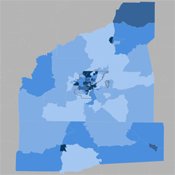The Jackson metro has some of the most concentrated poverty areas in the country, with the majority of those poor individuals living inside city limits, a Brookings study released today finds. The report states that living in poor neighborhoods creates additional obstacles and burdens for individuals such as lack of quality education, increased crime rates, lower property values and lack of goods and services. Poverty also strains local governments.
"The Re-Emergence of Concentrated Poverty: Metropolitan Trends in the 2000s" evaluates how many poor people live in poor neighborhoods in the United States and how much that number has changed since 2000. The study defines extremely poor neighborhoods as having a poverty rate of 40 percent or more.
The study finds population in extremely poor neighborhoods in the country rose by one-third over the past 10 years, and southern metro areas reported a 33 percent increase in growth in the number of poor individuals in concentrated poor areas. Jackson is the sixth largest metro area with a 12.2 increase in concentrated poverty in the country. The city of Jackson is the seventh highest increase in concentrated poverty in the country at 22.4 percent.
In the Jackson metro area, the concentrated poverty rate rose by 22 percent from 2005 to 2009, compared to a 35.2 percent increase inside the city limits. The suburbs experienced a 10.6 increase in poverty. The total metro area has 20,892 poor people living in extremely poor neighborhoods, and 4,954 of those people live in the suburbs.
Nationally, the population in extreme-poverty neighborhoods rose twice as fast in suburbs as in cities. Historically, pockets of extreme poverty have occurred primarily in urban areas. The number of extreme-poverty neighborhoods in suburban communities grew by 54 percent, compared to cities, which grew at 18 percent.
"The concentration of poor individuals and families--which can result in high rates of indigent patients at hospital and clinics at hospitals and clinics, and the need for increased policing--burdens the fiscal capacity of local governments, and can divert resources from the provision of other public goods. In turn, these dynamics can lead to higher taxes for local businesses and non-poor residents," the study reports.



Comments
Use the comment form below to begin a discussion about this content.
comments powered by Disqus